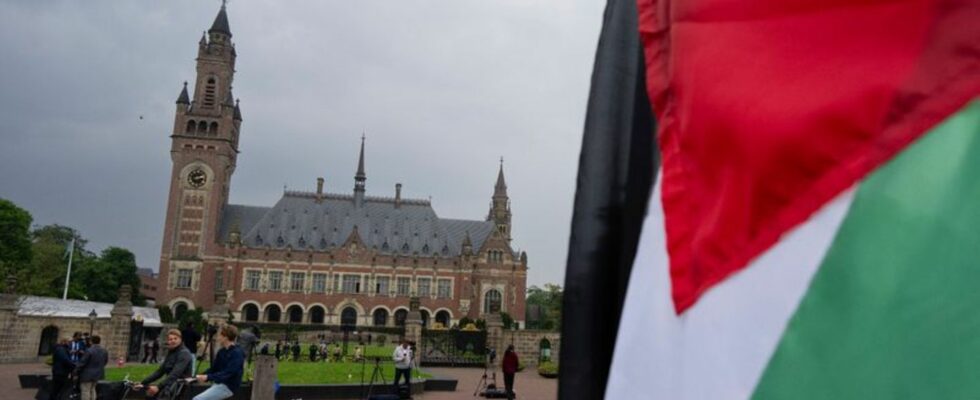Israel does not directly address the International Court of Justice’s decision. Instead, it refers to its right to self-defense. The news at a glance.
Tel Aviv/The Hague – Following the decision of the International Court of Justice (ICJ) to immediately halt the Israeli military operation in the city of Rafah in the south of the Gaza Strip, Israel has referred to its right to self-defense. In a joint statement by the Israeli Foreign Ministry and the Office of National Security, it was said that Israel had started a “just defensive war” after the terrorist attack on October 7 in order to eliminate the Islamist Hamas and free the hostages.
Israel also rejected the genocide accusations made by South Africa before the International Court of Justice (ICJ) as “false, outrageous and abhorrent”. UN Secretary-General António Guterres made it clear that he expects a halt to the Israeli military operation in Rafah. However, it is considered unlikely that Israel will implement the request.
Israel rejects allegations
The statement by the Israeli Foreign Ministry and the National Security Bureau further said that Israel had not carried out military operations in Rafah that created living conditions “that could lead to the total or partial annihilation of the Palestinian civilian population.” Israel would continue its efforts to allow humanitarian aid into the Gaza Strip and act in accordance with the law to minimize harm to the civilian population in the Gaza Strip. The statement did not elaborate on the ICJ’s orders.
With its decision, the ICJ obliged Israel to immediately end the military operation in Rafah. With this decision, the highest court of the United Nations in The Hague complied with several demands that South Africa had made in an urgent application. Decisions of the World Court are binding. However, the UN judges have no power to force a state to implement them.
UN court judges describe situation in Rafah as disastrous
According to the judges, the humanitarian situation in Rafah has become disastrous. Further measures are necessary to prevent further harm to the civilian population. The court now demanded that Israel “in accordance with its obligations under the Genocide Convention and in view of the deteriorating living conditions of the civilian population in the Rafah Governorate, immediately cease its military offensive and any other action in the Rafah Governorate that could impose living conditions on the Palestinians in the Gaza Strip that could bring about their physical destruction in whole or in part.”
It is unlikely that Israel will implement the call to end the Rafah operation. Government spokesman Avi Hyman said of such a demand: “No power in the world will stop Israel from protecting its citizens and taking action against Hamas in Gaza. We will destroy Hamas, we will restore peace and security for the people of Israel and the people of Gaza. We cannot tolerate a regime on our southern border that seeks genocide.”
Before the Israeli army began its invasion, more than a million internally displaced people from other parts of the Gaza Strip sought protection in Rafah. South Africa’s urgent application argues that it is about preventing genocide against Palestinians. Israel’s advance into Rafah began on May 6 in the east of the city bordering Egypt. Israel describes its controversial military action there as cautious and limited. According to information from the “Times of Israel”, 300,000 to 400,000 civilians are still in Rafah.
USA: “We have made our position on Rafah clear and unambiguous”
The US State Department responded to the ICJ decision with just one sentence: “We have clearly and unambiguously explained our position on Rafah,” said a ministry spokesman when asked by the German Press Agency. The USA, as Israel’s most important ally, recently stated that the operations in Rafah had not yet reached the extent that the US government had warned about.
The US opposes a major Israeli ground offensive in Rafah. Previous Israeli operations “have been more targeted and limited and have not included major military operations in the center of densely populated urban areas,” said US President Joe Biden’s security adviser Jake Sullivan.
The war was triggered by an unprecedented massacre by terrorists from Hamas and other extremist groups on October 7 last year in the Israeli border region. More than 1,200 people were killed in the terrorist attack and more than 250 were taken hostage to the Gaza Strip. According to the Hamas-controlled health authority, more than 35,800 people have been killed so far in the course of Israel’s subsequent military offensive in Gaza.
Border crossing for relief supplies will be reopened
Meanwhile, Egypt agreed to open the important Kerem Shalom border crossing in the south of the Gaza Strip for deliveries of humanitarian aid and fuel. President Abdel Fattah al-Sisi agreed to this in a conversation with his US counterpart Joe Biden, according to the Egyptian side. The White House said Biden welcomed the commitment to “provisionally” allow the delivery of humanitarian aid provided by the United Nations through the Kerem Shalom border crossing. “This will help save lives,” said the statement from the US government headquarters. The US had repeatedly called for the border crossing to be opened.
The border crossing to Egypt in Rafah was recently closed after the Israeli army took over the Palestinian side. The Kerem Shalom crossing between Israel and the Gaza Strip is located near the city of Rafah and the Egyptian border.
US government again calls for more humanitarian aid in Gaza
Following the ICJ decision, the US again called on Israel to allow more humanitarian aid throughout the Gaza Strip. US Secretary of State Antony Blinken discussed this issue with Benny Gantz, minister in Israel’s war cabinet, in a telephone conversation, ministry spokesman Matthew Miller said.
Blinken stressed the “urgent need” to protect civilians and humanitarian workers in the Gaza Strip and to de-escalate the situation in the West Bank. The phone call also addressed efforts to achieve a ceasefire and to prevent the conflict in the region from escalating, the statement said.

